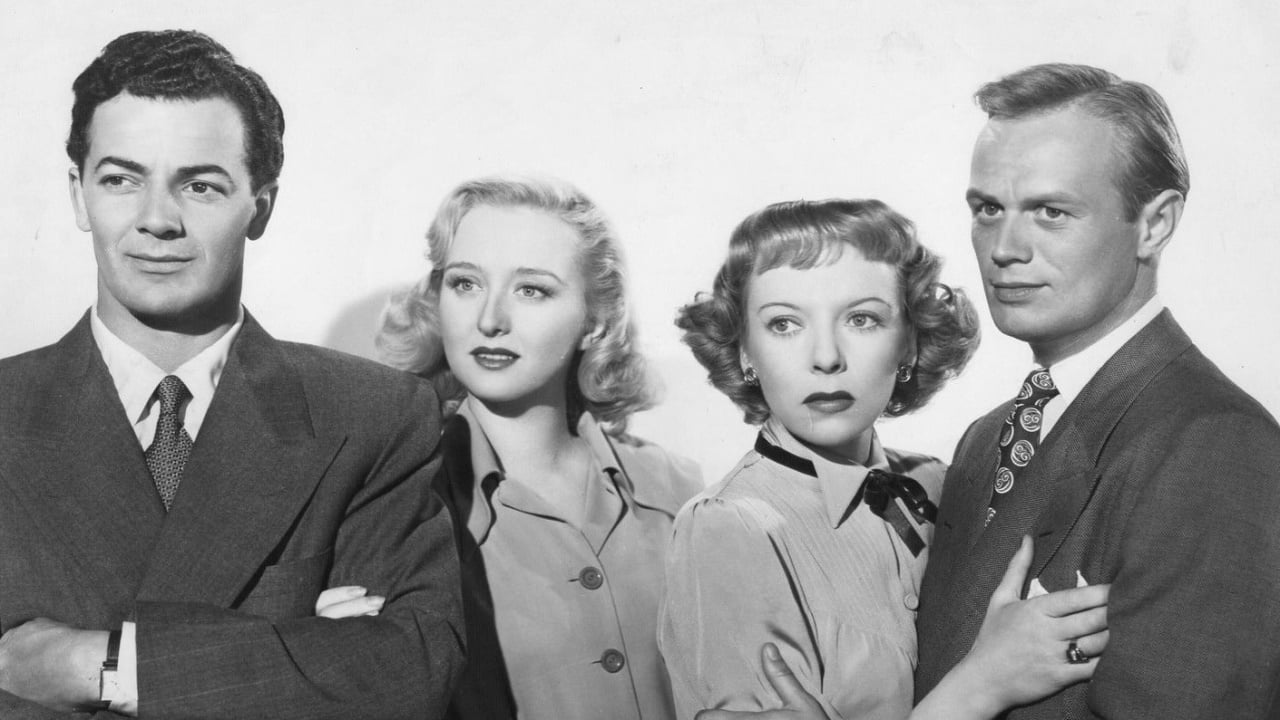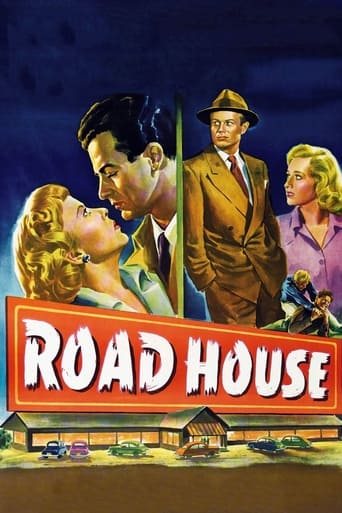Pluskylang
Great Film overall
Stellead
Don't listen to the Hype. It's awful
HomeyTao
For having a relatively low budget, the film's style and overall art direction are immensely impressive.
Spikeopath
Road House is directed by Jean Negulesco and adapted to screenplay by Edward Chodorov from a story by Margaret Gruen and Oscar Saul. It stars Ida Lupino, Cornel Wilde, Celeste Holm and Richard Widmark. Music is by Cyril J. Mockridge and cinematography by Joseph LaShelle.When Jefty Robbins (Widmark) brings new torch singer Lily Stevens (Lupino) to the Road House he owns, it causes friction between Jefty and his boyhood pal Pete Morgan (Wilde). So much so it will have dire consequences for some...I guess this is a moose trap all around.Love triangle noir that comes away from the city and out to the sticks, Road House rises above the clichéd storyline to become engrossing entertainment. Narrative stays straight and true, two pals from way back are divided by the appearance of a woman on the scene, it's going to end bad for someone and the audience knows this, and they know who it's going to be, which sadly nullifies the mystery element. But the characters are well drawn and well performed, with Negulesco (The Mask of Dimitrios) able to paper over the cracks without using pointless filler. The big rewards here come in Widmark's coiled spring performance and the script which is full of acid tongued barbs and sardonic observations.The backdrop is most unusual in terms of genre conventions, the Road House of the title is an out of the way bar with a bowling alley out in back country Americana. This is a bar that reeks of moose hunting and forests, it's all very rustic and rural, with the fashions adorned by the principals reflecting their surroundings, but LaShelle's photography keeps us in the noir frame of mind with classic isolated lighting. There's also some musical numbers performed by Lupino, she has a husky voice that while it isn't exactly musical grace, it conjures up a feeling of too many cigarettes and bourbon, with a sadness befitting the mood of the songs, particularly where the standout "One For My Baby (And One More For The Road)" is concerned.Unusual at times and not as "drastic" as the source story hints it could have been, but very much one for the noir faithful to enjoy. 7/10
kenjha
The employees of a road side nightclub become involved in a love quadrangle, leading to tension. Lupino is fine as the tough saloon singer, even warbles a few songs at the piano. Wilde is the earnest but hunky fellow she is attracted to, much to the dismay of Widmark (who likes Lupino) and Holm (who likes Wilde). As was often the case early in his career, Widmark plays a psycho with a maniacal laugh, overacting to the hilt. Holm is given little to do but she does it well enough. The script is contrived and melodramatic, but Negulesco creates a nice film noirish atmosphere, culminating in an exciting finale in fog-filled woods.
classicsoncall
Not only was Ida Lupino a first rate actress, but a pretty shrewd businesswoman as well. She purchased the rights to "Road House" for twenty thousand dollars, then wound up with a tidy sum of a hundred thirty grand for signing on with RKO to do the picture. Now that's putting some credibility in 'One For My Baby'.You know, I could watch Richard Widmark all day doing that maniacal laugh of his. It's great when he builds up to it like he does here, starting out as the somewhat absentee owner of Jefty's Road House, right through the complicated relationship that develops between himself, singer Lily Stevens (Lupino) and business manager Pete Morgan (Cornel Wilde). It's like he's building on his Tommy Udo character from 1947's "Kiss of Death", Widmark's first film role.Yet on the flip side, there's not a whole lot about this story that makes sense if set in the real world, particularly as it relates to that jury trial over the stolen money. How does the plaintiff get to go into the judge's chambers to seek clemency for the defendant? Didn't these guys have lawyers? And what about the 'proof' Susie claims she found when she spots the business envelope that contained the missing money? So? It was an envelope that Jefty had on him - why wouldn't he? He owned the business! But to get even that far, you had to take it on faith that the police captain never even considered that Jefty might have been setting up his manager. You could go around in circles all night like this and not make sense of the story.But, and this is the significant but, all of this is set in a noir world that sucks the viewer in with it's flawed femme fatale with the gravel voice and the mugs who want her. So you're willing to overlook the credibility defying moments, and just go along for the ride for the final payoff. Along the way you get Widmark and Wilde in that great bar room brawl, and Ida Lupino makin' it for her baby with one more for the road.
Neil Doyle
What stands out in ROAD HOUSE, despite the lurid melodramatics of the plot, is RICHARD WIDMARK doing his standard psychopathic job once he discovers his love life has been compromised when IDA LUPINO and CORNEL WILDE fall in love with each other. Widmark takes full advantage of his character's sudden turn from nice guy to a man consumed by cunning jealousy, trapping Wilde into a charge of theft that almost puts the victimized man into prison.Widmark gets the judge to suspend sentence and has Wilde's parole placed under his management. At this point, the plot becomes wildly melodramatic and churns up the heat for the last twenty minutes of explosive emotional fireworks. The fight scenes between Widmark and Wilde are artfully staged and look painfully realistic.Widmark and Lupino dominate the film with forceful work, full of intensity. Wilde is impressively quiet but determined and looks like he'd make a good bouncer at any bar. CELESTE HOLM has more of an onlooker role that does nothing for her career but does about as well as she can with a nothing part.Jean Negulesco has done much better work in other melodramas (notably JOHNNY BELINDA). Here, he directs the film well but lets the melodrama get a bit too overwrought by the time the film winds toward a conclusion. It's not one of his best films.Ida Lupino's husky voice is barely able to wobble through a few good song numbers, which makes her nightclub scenes a little ludicrous. It's one thing to have a throaty voice for standard pop tunes sung in a husky manner, but Lupino's vocals suffer from her one-note monotone delivery.

